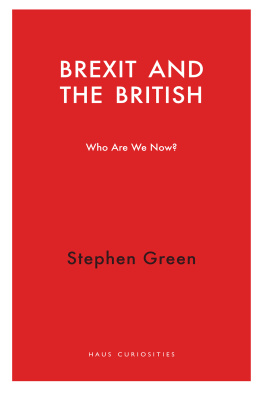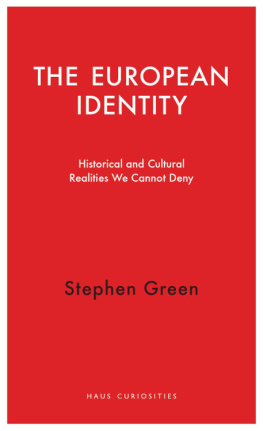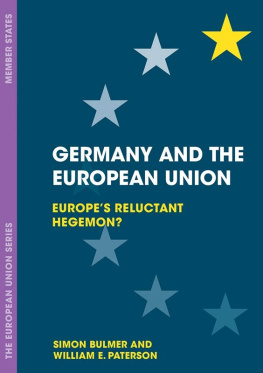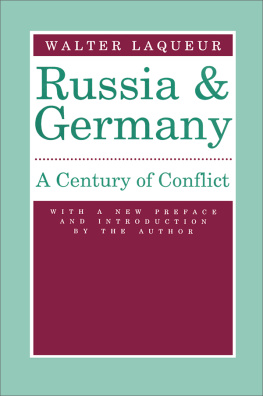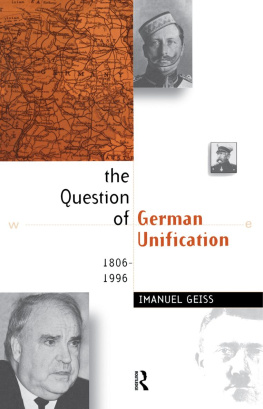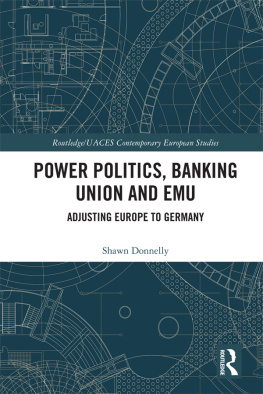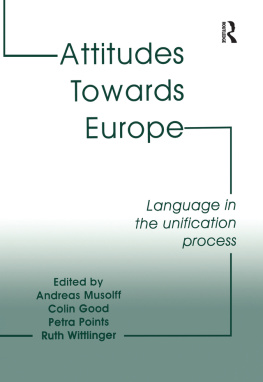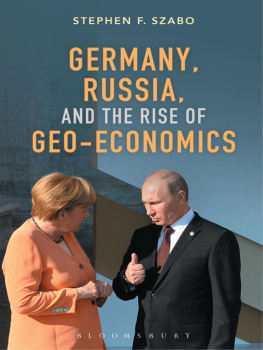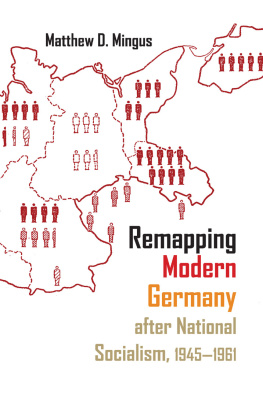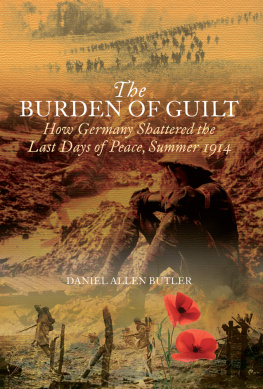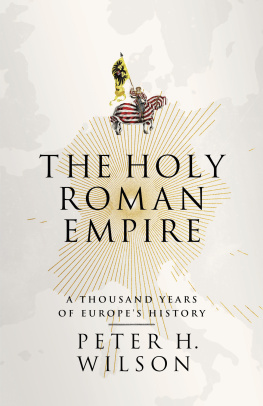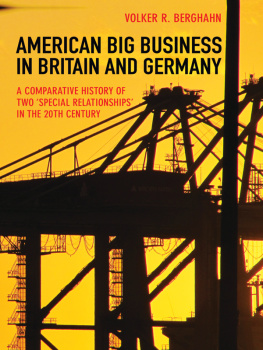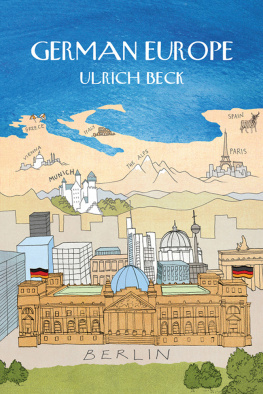Stephen Green traces the relationship between Germany and Europe over 2,000 years, from the Germanic tribes victory over the Romans to the Bundesrepubliks cautious response to Ukraine. He guides us deftly through politics and poetry, theology and economics to allow the reader to understand how Germany the reticent giant sees itself and its role in the Europe of tomorrow. This is the history that is now shaping our continent: Stephen Green is the ideal person to help us understand it.
Neil MacGregor, author of Germany: Memories of a Nation
The miracle, as Lord Green rightly points out, is that from this state of total collapse, Germany rose again to become a country with model democratic institutions and a highly successful economy.
Economist
For Stephen Green, Germanys greatest achievement has been in coming to terms with its history. The process of confrontation has been neither easy nor quick, he says. There are many who have gone to their graves without being honest to themselves about their sins of omission and commission. But for all its imperfections, this atonement has been more thoroughgoing than in most other countries where human evil has been rampant within living memory. It would be hard to put it better.
Financial Times
a readable and personal introduction to German history and above all its art, literature and music Like other British writers such as Peter Watson and Simon Winder, [Stephen Green] sets out to correct and enlarge British perceptions of Germany, which, he argues, focus excessively on the Third Reich.
Times Literary Supplement
the best book of 2014 was Reluctant Meister, Stephen Greens superb analysis of German history and culture.
Globe and Mail
a pragmatic and courageous outlook on Germany.
Die Zeit
Lord Green writes so vividly the scope of his work is such that, if he had been a professor of German, it would still be a notable achievement.
Church Times
Reluctant Meister
STEPHEN GREEN was for most of his career an international banker. From 2011 to 2013 he was Minister for Trade and Investment in the British Government. He now has a range of international advisory activities focusing on international trade, on financial and professional services and on child poverty and development programmes. He chairs the Natural History Museum of London and is an ordained priest of the Church of England.
He is the author of Good Value: Money, Morality and an Uncertain World, and of The European Identity: Historical and Cultural Realities We Cannot Deny.
In Reluctant Meister Green writes about a country whose culture and history had attracted him since he was sent there as a child to learn more of the language. His fascination with Germany a country which is now central to a Europe struggling to find its identity in a new global landscape has only grown over time.
Reluctant Meister
Germany and the new Europe
Stephen Green
First published in Great Britain in 2014 by
Haus Publishing Ltd
70 Cadogan Place
London SW1X 9AH
www.hauspublishing.com
This first paperback edition published in 2016
Copyright Stephen Green, 2016
The right of Stephen Green to be identified as the author of this work has been asserted in accordance with the Copyright, Designs and Patents Act 1988
A CIP catalogue record for this book is available from the British Library
Extract from Christabel Bielenbergs The Past is Myself copyright 1968 Christabel Bielenberg. Reprinted by kind permission of Corgi, an imprint of Transworld Publishers, a division of Random House LLC. All rights reserved.
Extract from Gitta Serenys Into That Darkness: An Examination of Conscience copyright 1974 Gitta Sereny. Reprinted by kind permission of the author and Vintage Books, an imprint of the Knopf Doubleday Publishing Group, a division of Random House LLC. All rights reserved.
Extract from Michael Frayns Copenhagen copyright 1998 Michael Frayn. Reprinted by kind permission of Anchor Books, a division of Random House LLC. All rights reserved.
Print ISBN 978-1-910376-57-7
Ebook ISBN 978-1-908323-69-9
Typeset in Minion by MacGuru Ltd
All rights reserved.
Contents
For Jay and our daughters Suzannah and Ruth
And for our grandchildren: Heather, James, William, Andrew, Samuel, Hannah and Phoebe
SINCE MY SCHOOL DAYS I have been fascinated by all things German. To start with, it was the German language a language which seemed to me such a robust kindred spirit of English. All those Anglo-Saxon words that earth the English language they had cousins you could recognise in German. And German also had all those wonderful multi-syllable mouthfuls built up from the basic words. You could construct things in German, as if it were a Lego language.
The classic example, which was guaranteed to produce hilarity in the classroom, was the legendary Donaudampfschifffahrtsgesellschaftskapitn the Danube steamship company captain. And it was easy to make up words that were still longer. But even without going to such lengths, German compound words are often so expressive or hard to translate that English, that great borrower from all languages, has simply taken them on board as they are: Apfelstrudel, Bildungsroman, Blitzkrieg, Dachshund, Delikatessen, Doppelgnger, Edelweiss, Einsatzgruppe, Glhwein, Gtterdmmerung, Kristallnacht, Lebensraum, Leitmotiv, Poltergeist, Realpolitik, Schadenfreude, Singspiel, bermensch, Untermensch, Volkswagen, Wanderlust, Weltanschauung, Wirtschaftswunder, Zeitgeist. And many others. I was enthralled by the mixture of the good, the profound, the innocuous and the sinister in the language that English borrowed from Germany. I always felt it revealed much about the culture from which those words came.
Then there is the literature that the language unveils if you grapple with it. Above all Faust, which I studied (not nearly thoroughly enough) at university. And the philosophy (ditto). And the music yes, the music. My first serious brush with classical music was at school. It was the autumnal tones of Brahms: first, the Variations on a Theme by Joseph Haydn, played I can remember it now by the Concertgebouw Orchestra under Eugene Ormandy. Especially the seventh variation that soared into a heaven which was entirely new to me. Then the Third Symphony, on an LP with a cover photograph of woodland trees with their colours turning. So Brahms became my first real musical love. Now I listen to him on my iPad as I write this preface.
Over the years my love of classical music has broadened and deepened: later in some cases, much later I came to know something of the intricate geometry of Bach and the huge panoramas of Wagner, not to mention the agility of Mozart, the passion of Beethoven, the exquisite tunefulness of Schubert, the sumptuousness of Richard Strauss. And so on. Other musical traditions have transported me too: Italians and Russians in particular. But my first love remains the breadth, depth and intensity of German music, which has never been surpassed.
My first visit to Germany was to a family who lived in Bavaria. It was the school holidays: I was meant to improve my German. I dont think I made much progress over the three weeks. But I was introduced to what the mother described firmly as richtige Bergwanderungen real mountain hikes. Another love that has remained with me ever since.


